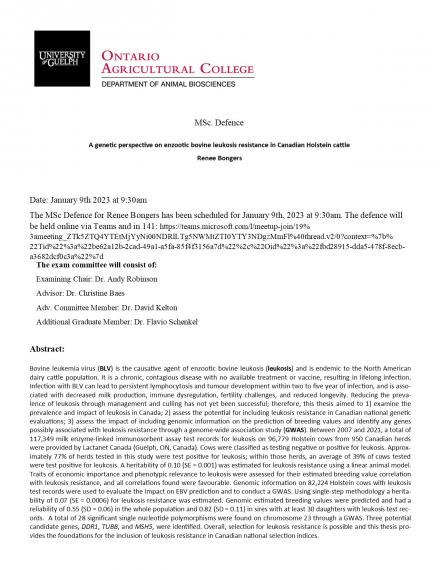Teams and 141 https://teams.microsoft.com/l/meetup-join/19%3ameeting_ZTk5ZTQ4YTEtMjYyNi00NDRlLTg5NWMtZTI0YTY3NDgzMmFl%40thread.v2/0?context=%7b%22Tid%22%3a%22be62a12b-2cad-49a1-a5fa-85f4f3156a7d%22%2c%22Oid%22%3a%22fbd28915-dda5-478f-8ecb-a3682dcf0c3a%22%7d

Bovine leukemia virus (BLV) is the causative agent of enzootic bovine leukosis (leukosis) and is endemic to the North American dairy cattle population. It is a chronic, contagious disease with no available treatment or vaccine, resulting in lifelong infection. Infection with BLV can lead to persistent lymphocytosis and tumour development within two to five year of infection, and is associated with decreased milk production, immune dysregulation, fertility challenges, and reduced longevity. Reducing the prevalence of leukosis through management and culling has not yet been successful; therefore, this thesis aimed to 1) examine the prevalence and impact of leukosis in Canada; 2) assess the potential for including leukosis resistance in Canadian national genetic evaluations; 3) assess the impact of including genomic information on the prediction of breeding values and identify any genes possibly associated with leukosis resistance through a genome-wide association study (GWAS). Between 2007 and 2021, a total of 117,349 milk enzyme-linked immunosorbent assay test records for leukosis on 96,779 Holstein cows from 950 Canadian herds were provided by Lactanet Canada (Guelph, ON, Canada). Cows were classified as testing negative or positive for leukosis. Approximately 77% of herds tested in this study were test positive for leukosis; within those herds, an average of 39% of cows tested were test positive for leukosis. A heritability of 0.10 (SE = 0.001) was estimated for leukosis resistance using a linear animal model. Traits of economic importance and phenotypic relevance to leukosis were assessed for their estimated breeding value correlation with leukosis resistance, and all correlations found were favourable. Genomic information on 82,224 Holstein cows with leukosis test records were used to evaluate the impact on EBV prediction and to conduct a GWAS. Using single-step methodology a heritability of 0.07 (SE = 0.0006) for leukosis resistance was estimated. Genomic estimated breeding values were predicted and had a reliability of 0.55 (SD = 0.06) in the whole population and 0.82 (SD = 0.11) in sires with at least 30 daughters with leukosis test records. A total of 28 significant single nucleotide polymorphisms were found on chromosome 23 through a GWAS. Three potential candidate genes, DDR1, TUBB, and MSH5, were identified. Overall, selection for leukosis resistance is possible and this thesis provides the foundations for the inclusion of leukosis resistance in Canadian national selection indices.

